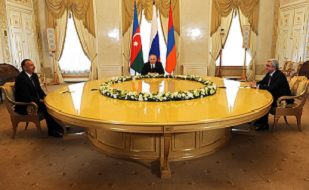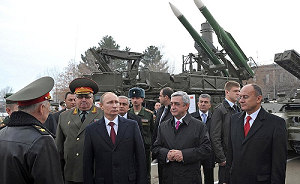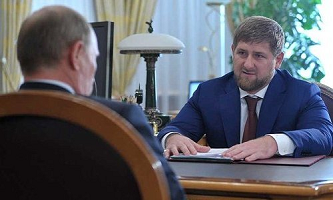Russia’s Iskander Adventures in the Caucasus
By Stephen Blank
May 12, 2017, the CACI Analyst
Since the occurrence of large scale fighting around Nagorno-Karabakh in April 2016, resulting in some Azerbaijani gains, there has been a widespread fear that this crisis could easily escalate out of control drawing in not only the two belligerents but also Russia and Turkey. Armenia’s response to the visible enhancement of Azerbaijan’s military capability has marked a qualitative escalation of the crisis’ military potential. Moreover, it has further unmasked the Russian policy of abetting the crisis rather than trying to resolve it, even though Moscow professes to be against renewed hostilities and to want a solution.

The Kremlin’s Security Strategy in the South Caucasus: Implications for Baku
By Anar Valiyev
March 7, 2017, the CACI Analyst
On November 30, 2016, the defense ministries of Armenia and Russia signed an agreement to establish a joint Russian-Armenian Military Joint Task Force (MJTF). In June 2016, Armenia agreed to join Russia's regional air security system designed to protect Russia's southern borders and its allies. The treaty allowed Armenia to rely on Russia's anti-aircraft system and military satellites in order to defend its airspace. In late September 2016, it was revealed that Moscow had transferred the Iskander mobile short-range missile system to Armenia. These recent developments have raised serious concerns in Baku over Armenia's military buildup and its consequences for the Nagorno-Karabakh conflict.

The Kremlin’s Last Resort: Kadyrovtsi in Russia’s National Guard
By Dmitry Shlapentokh
March 3, 2017, the CACI Analyst
Russia’s economic condition remains precarious, mostly due to low oil prices, whereas Western sanctions have created additional problems. There are so far few signs of public discontent and Putin’s approval ratings remain high. Yet the Russian leadership apparently does not exclude the possibility of mass protests similar to those erupting in early 2012, which could spread and create a problem for the regime. In response to this possible scenario, Putin announced the creation of a National Guard in April 2016, a process that should be completed in 2017. The National Guard incorporated Chechen forces loyal to Ramzan Kadyrov, which could be deployed by the regime as a last resort.

Karakbakh negotiations on hold as Armenia gears up for parliamentary elections
By Armen Grigoryan
January 12th, 2017, The CACI Analyst
Further negotiations on the Nagorno-Karabakh issue seem to be practically postponed until Armenia completes its parliamentary elections in April 2017. At the same time, the government demonstrates an unwillingness to proceed beyond rhetoric with governance and economic reforms. The administration’s inability to deliver satisfactory economic results and ensure social development, as well as its close connections with Russia with a strong clientelism component, suggest a further growth of dependence and compliance with Moscow’s political agenda.
New tracks for Nagorno-Karabakh conflict resolution: separate tasks, complementary missions for Russia and the OSCE Minsk Group?
By Zaur Shiriyev
September 12th, 2016, The CACI Analyst
In the wake of the St. Petersburg meeting, it has become clear that two, distinct peace processes are in play. The OSCE Minsk Group is creating a technical conflict prevention mechanism, while Russia is leading a conflict resolution process. However, while they may appear distinct – and therefore potentially conflicting – these parallel tracks are complementary.







